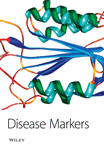Novel ERBB Receptor Feedback Inhibitor 1 (ERRFI1) + 808 T/G Polymorphism Confers Protective Effect on Diabetic Nephropathy in a Korean Population
Abstract
BACKGROUND: The identification and characterization of the gene, ERRFI1, in diabetes has not been reported. In this study, we evaluated the relationship between ERRFI1 polymorphism and characteristics of type 2 diabetes mellitus (T2DM) in Korea.
SUBJECTS AND METHODS: We conduct a case-control study involving T2DM patients (n=342) and controls (n=473).
RESULTS: A novel single nucleotide ERRFI1 gene polymorphism at +807(T/G) was found. G genotype frequency was 40.1% in the diabetic group and 42.7% in the control group; the difference was not significant (p=0.45). In the diabetic group, the urine albumin to creatinine ratio (ACR) was lower in the G genotype than in the T genotype (P=0.004). In males with T2DM, those with the G genotype displayed lower systolic blood pressure (P=0.01) and higher glomerular filtration rate (P=0.048) compare to those with the T genotype. In females with T2DM, urine ACR was low in those with the G genotype than in those with the T genotype (P=0.02). In the diabetic group, patients who harboring T allele had a 1.81 times higher risk of diabetic nephropathy than the G allele (95% CI 1.11–2.96, P=0.02). In females with T2DM, patients who harboring T allele had a 2.12 times higher risk of diabetic nephropathy (95% CI 1.07–4.1, P=0.03).
CONCLUSIONS: We identify new loci associated with glycemic traits in diabetes and this finding indicates the potential of ERRFI1 as a novel therapeutic target of diabetic nephropathy.




